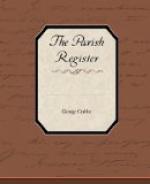With what regret these painful journeys end;
When from the cradle to the grave I look,
Mine I conceive a melancholy book.
Where now is perfect resignation seen?
Alas! it is not on the village-green: —
I’ve seldom known, though I have often read,
Of happy peasants on their dying-bed;
Whose looks proclaimed that sunshine of the breast,
That more than hope, that Heaven itself express’d.
What I behold are feverish fits of strife,
’Twixt fears of dying and desire of life:
Those earthly hopes, that to the last endure;
Those fears, that hopes superior fail to cure;
At best a sad submission to the doom,
Which, turning from the danger, lets it come.
Sick lies the man, bewilder’d, lost, afraid,
His spirits vanquish’d, and his strength decay’d;
No hope the friend, the nurse, the doctor lend —
“Call then a priest, and fit him for his end.”
A priest is call’d; ’tis now, alas! too late,
Death enters with him at the cottage-gate;
Or time allow’d—he goes, assured to find
The self-commending, all-confiding mind;
And sighs to hear, what we may justly call
Death’s common-place, the train of thought in all.
“True I’m a sinner,” feebly he begins,
“But trust in Mercy to forgive my sins:”
(Such cool confession no past crimes excite!
Such claim on Mercy seems the sinner’s right!)
“I know mankind are frail, that God is just,
And pardons those who in his Mercy trust;
We’re sorely tempted in a world like this —
All men have done, and I like all, amiss;
But now, if spared, it is my full intent
On all the past to ponder and repent:
Wrongs against me I pardon great and small,
And if I die, I die in peace with all.”
His merits thus and not his sins confess’d,
He speaks his hopes, and leaves to Heaven the rest.
Alas! are these the prospects, dull and cold,
That dying Christians to their priests unfold?
Or mends the prospect when th’ enthusiast cries,
“I die assured!” and in a rapture dies?
Ah, where that humble, self-abasing mind,
With that confiding spirit, shall we find;
The mind that, feeling what repentance brings,
Dejection’s terrors and Contrition’s stings,
Feels then the hope that mounts all care above,
And the pure joy that flows from pardoning love?
Such have I seen in Death, and much deplore,
So many dying—that I see no more:
Lo! now my Records, where I grieve to trace
How Death has triumph’d in so short a space;
Who are the dead, how died they, I relate,
And snatch some portion of their acts from fate.
With Andrew Collett we the year begin,
The blind, fat landlord of the Old Crown Inn, —
Big as his butt, and, for the selfsame use,
To take in stores of strong fermenting juice.
On his huge chair beside the fire he sate,
In revel chief, and umpire in debate;
Each night his string of vulgar tales he told,
When from the cradle to the grave I look,
Mine I conceive a melancholy book.
Where now is perfect resignation seen?
Alas! it is not on the village-green: —
I’ve seldom known, though I have often read,
Of happy peasants on their dying-bed;
Whose looks proclaimed that sunshine of the breast,
That more than hope, that Heaven itself express’d.
What I behold are feverish fits of strife,
’Twixt fears of dying and desire of life:
Those earthly hopes, that to the last endure;
Those fears, that hopes superior fail to cure;
At best a sad submission to the doom,
Which, turning from the danger, lets it come.
Sick lies the man, bewilder’d, lost, afraid,
His spirits vanquish’d, and his strength decay’d;
No hope the friend, the nurse, the doctor lend —
“Call then a priest, and fit him for his end.”
A priest is call’d; ’tis now, alas! too late,
Death enters with him at the cottage-gate;
Or time allow’d—he goes, assured to find
The self-commending, all-confiding mind;
And sighs to hear, what we may justly call
Death’s common-place, the train of thought in all.
“True I’m a sinner,” feebly he begins,
“But trust in Mercy to forgive my sins:”
(Such cool confession no past crimes excite!
Such claim on Mercy seems the sinner’s right!)
“I know mankind are frail, that God is just,
And pardons those who in his Mercy trust;
We’re sorely tempted in a world like this —
All men have done, and I like all, amiss;
But now, if spared, it is my full intent
On all the past to ponder and repent:
Wrongs against me I pardon great and small,
And if I die, I die in peace with all.”
His merits thus and not his sins confess’d,
He speaks his hopes, and leaves to Heaven the rest.
Alas! are these the prospects, dull and cold,
That dying Christians to their priests unfold?
Or mends the prospect when th’ enthusiast cries,
“I die assured!” and in a rapture dies?
Ah, where that humble, self-abasing mind,
With that confiding spirit, shall we find;
The mind that, feeling what repentance brings,
Dejection’s terrors and Contrition’s stings,
Feels then the hope that mounts all care above,
And the pure joy that flows from pardoning love?
Such have I seen in Death, and much deplore,
So many dying—that I see no more:
Lo! now my Records, where I grieve to trace
How Death has triumph’d in so short a space;
Who are the dead, how died they, I relate,
And snatch some portion of their acts from fate.
With Andrew Collett we the year begin,
The blind, fat landlord of the Old Crown Inn, —
Big as his butt, and, for the selfsame use,
To take in stores of strong fermenting juice.
On his huge chair beside the fire he sate,
In revel chief, and umpire in debate;
Each night his string of vulgar tales he told,




